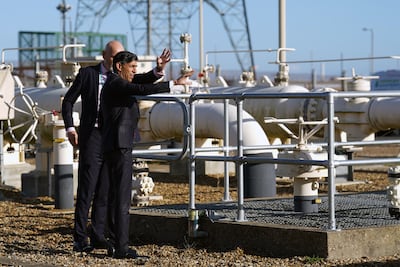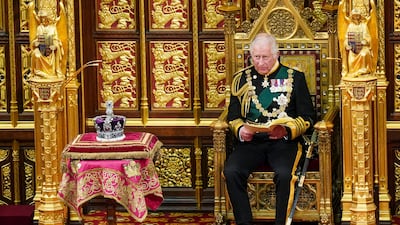On Tuesday, parliament hosted the UK's first King's Speech in seven decades.
The speech, the king's first and the last before the next general election, set out 20 bills, covering issues including oil and gas licences, and football governance.
The speech effectively launched Prime Minister Rishi Sunak’s bid to keep his Conservative Party in power at a general election expected next year.
As the Tories trail Keir Starmer’s Labour Party by about 20 points in opinion polls, the King’s Speech is one of the biggest remaining chances for Mr Sunak to persuade voters his government is pursuing policies they want.
Energy, crime and housing featured heavily as he tries to get his party on the front foot.
These are the 20 bills that were announced on Tuesday:
Economic Activities of Public Bodies (Overseas Matters) Bill
This bill, carried over from the last parliament, prevents public bodies from imposing their own direct or indirect boycotts, divestment or sanctions campaigns against other countries, which the government said disproportionately target Israel.
Coming during an upsurge in anti-Israel protests amid the Gaza war, it would outlaw campaigns that specifically deny the purchase of goods, services and investments.
It does not have universal support, with some MPs warning it could stoke community tensions and potentially breach international agreements.
Two Labour-led councils, Lancaster City and Leicester City, have previously passed motions to boycott goods from Israeli settlements on occupied territory.
A government representative said: “This bill will tackle the real risk to community cohesion posed by public institutions using taxpayer money to pursue their own foreign policy agenda and will ensure the UK speaks with one voice internationally.
“We will continue to engage with and listen to stakeholders, parliamentarians and communities across the UK throughout the passage of the bill.”
Offshore Petroleum Licensing Bill
This will mandate licences for oil and gas projects in the North Sea to be awarded annually.
The government has argued this would enhance the UK's energy security, but it also causes a headache for Labour, which has said it would ban new exploration licences to focus on renewable energy if it wins power.
On Monday, the Energy Secretary Claire Coutinho admitted the plan "wouldn't necessarily" bring down household bills.

"But it would, as I say, raise a significant amount of money that would help us, for example, fund public services, also fund transition into different forms of energy, for example, things like offshore wind and solar energy which more broadly and indirectly could help bring bills down," she added.
Football Governance Bill
Establishes a new independent football regulator, with the body set to have powers to step in and resolve how money flows from the Premier League down the pyramid.
The bill will reportedly "scrutinise owners and their financial resources, and also set a standard of fan engagement as part of the licensing regime".
Clubs will have to prove they have "sound finances" and ensure that assets, such as stadiums, are protected.
Holocaust Memorial Bill
This hybrid bill is also being brought back to support the building of a national Holocaust memorial in Victoria Tower Gardens next to parliament.
It updates a 1900 law that prevented the project from going ahead and allows the government to use public funding to build and operate the centre. The government has restated its efforts to tackle anti-Semitism in the wake of the Hamas attack on Israel last month.
Automated Vehicles Bill
Paves the way for the introduction of self-driving cars and buses on UK roads by putting in place a legal framework centred on safety and user protection, as part of the Prime Minister's plans to make the UK a world leader in emerging technology.
Investigatory Powers (Amendment) Bill
Provides a legal framework for intelligence agencies to access information they need to tackle threats.
Terrorism (Protection of Premises) Bill
Also known as Martyn's Law, the bill requires venues to take steps to be better prepared to respond in the event of a terrorist attack.
Pedicabs (London) Bill
Enables Transport for London to introduce fare controls and a licensing regime for pedicabs – the only form of unregulated transport on the capital's roads – and bar them from congested areas.

Trade (Comprehensive and Progressive Agreement for Trans-Pacific Partnership) Bill
Enables the UK's formal accession to a major Indo-Pacific trade bloc of 11 nations after it signed an agreement earlier this year.
Digital Markets, Competition and Consumers Bill
This Bill, which has been carried over from the last session, aims to make it harder for firms to trap people in unwanted subscription contracts, take action against fake reviews and drip pricing, and increase competition between big tech firms.
Data Protection and Digital Information Bill
Also making a return, this aims to update the UK's data protection laws post-Brexit and strengthen the regulator.
Media Bill
This will repeal a law requiring media outlets to pay all legal costs in libel cases, regardless of who won. It will also reduce regulatory burdens on commercial radio stations.
Streaming giants will be subject to a new video-on-demand code, which will be drafted and enforced by the media watchdog Ofcom.
Arbitration Bill
Modernises the law, allowing arbitrators to kick out baseless claims quickly and strengthening the courts' supporting powers.
Draft Rail Reform Bill
Aims to modernise rail including by setting up the new Great British Railways public body. It was not expected in the speech as it was seen as a priority of former prime minster Boris Johnson but not for Mr Sunak. As a draft, it is unlikely to make it on to the statute books in this session.
Tobacco and Vapes Bill
Stops children turning 14 this year or younger from ever legally buying cigarettes or tobacco in England and aims to crack down on vaping among youngsters.

Leasehold and Freehold Bill
Brings forward much-delayed plans for leasehold reform, including capping ground rents and extending the length of leases from 90 to 990 years. But the proposals have been watered down, with leasehold banned for new houses but not new flats.
Renters (Reform) Bill
The Bill, which had provoked the ire of some Tory MPs, has also been carried over. It includes a long-awaited ban on "no-fault" evictions but only after stronger possession grounds for landlords and a new court process are in place. It also strengthens powers to evict antisocial tenants and ends a blanket ban on pets.
It also axes plans to require landlords to meet energy efficiency targets by from 2025, as part of the Prime Minister's rollback of a string of green measures announced in September.
Animal Welfare (Livestock Exports) Bill
Permanently bans the live export of cattle, sheep, goats, pigs and horses for slaughter and fattening from England. Does not include measures to outlaw the importing of hunting trophies as promised in the 2019 Tory manifesto.
Sentencing Bill
Mandates courts to hand down a whole-life order in the worst cases of murder, with judges having discretion to impose a shorter tariff only in exceptional circumstances.
The legislation will also ensure that rapists and serious sexual offenders serve the whole of their sentence behind bars, without being released early on licence.
Criminal Justice Bill
Forces criminals to attend their sentencing hearings, after serial baby killer Lucy Letby's refusal to leave her cell. It also gives police powers to enter a property without a court warrant to seize stolen goods such as phones tracked through GPS location-tracking technology, while criminalising the sharing of intimate images.
Victims and Prisoners Bill
Continuing its progress in the Commons, the Bill gives ministers the power to block parole for the worst offenders and ban them from marrying in prison.













